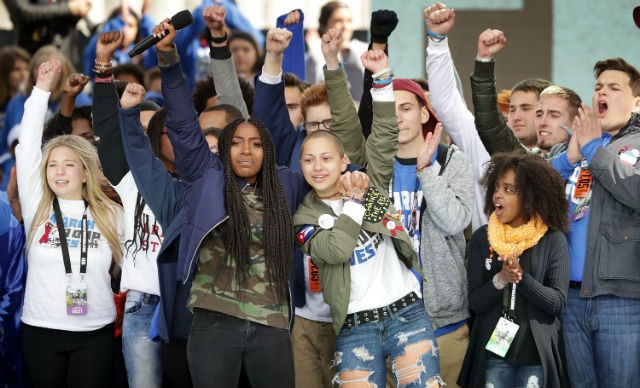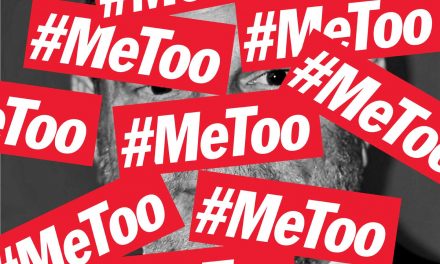The following is a guest post from Andrew Kuzma, who has his Ph.D. in moral theology from Marquette University, and currently teaches morality at a Catholic high school in Milwaukee.
Why are we not doing more to reduce gun violence? It’s a question that I have been asking myself lately, as a Catholic and as a moral theologian, but especially as a Catholic high school teacher. In that realm, talking about gun violence is taboo because it commits the unpardonable offense of being “political.” My school, I would wager, is not unique in this regard. Nor is it all that different from the parishes and dioceses that avoid the issue hoping to curb any potential divisiveness. And yet, our bishops call for change. We follow a social teaching that promotes the common good and justice for the most vulnerable. We name our schools after saints who loved peace, abhorred violence, and spoke truth to power. We worship a savior who blessed peacemakers, taught us to turn the other cheek, and advised his own student that those who live by the sword die by the sword. What is the point of a Catholic education if not to share this teaching? Literal children are crying out for change. If we really believe that peacemakers are the children of God, then every Catholic school and parish should be standing and marching against gun violence.
I do not call for Catholics to reject absolutely every form of gun ownership, but to follow the clear, practical direction offered by Catholic teaching. While I think there is a strong case to be made that Catholics should always abstain from taking up arms, I only want to point out that we have a clear path to follow. America has a gun problem. Whatever the underlying causes of gun violence in this country, the overabundance of guns only exacerbates it.
We can summarize America’s problem simply. America has more guns per person than any other country in the world. Generally speaking, the more guns in a country, the more injuries and deaths that occur in that country. America has more firearm homicides than any other developed nation, though most gun-related deaths in the U.S. are suicides. Vox has done a good job compiling the statistics behind these statements here and here.
After Parkland, many bishops called for action—not for the first time. Cardinal Blase Cupich stated: “let us make it clear to our elected officials that the weapons and ammunition that facilitate this carnage have no place in our culture” He has made similar remarks many times before. Bishop Frank J. Dewane of Venice, Florida and Bishop George V. Murry, S.J. of Youngstown, Ohio released a statement calling for concrete actions, among them “setting a more appropriate minimum age for gun ownership, requiring universal background checks…and banning ‘bump stocks’.” Just last month, the USCCB Department of Justice, Peace, and Human Development released a statement reiterating the bishops’ longstanding support of measures to reduce gun violence and advocating the following:
- A total ban on assault weapons, which the USCCB supported when the ban passed in 1994 and when Congress failed to renew it in 2004.
- Measures that control the sale and use of firearms, such as universal background checks for all gun purchases;
- Limitations on civilian access to high-capacity weapons and ammunition magazines;
- A federal law to criminalize gun trafficking;
- Improved access to and increased resources for mental health care and earlier interventions;
- Regulations and limitations on the purchasing of handguns;
- Measures that make guns safer, such as locks that prevent children and anyone other than the owner from using the gun without permission and supervision; and
- An honest assessment of the toll of violent images and experiences which inundate people, particularly our youth.
Not only do these measures come directly from the bishops, they also cohere with Catholic social teaching. The commitment to solidarity should lead us to stand with the victims of gun violence. Following the principle of subsidiarity, we should call out those local and state laws that fail to keep guns out of the wrong hands (including the hands of children). Above all, CST’s focus on the common good should lead us ask what better serves the community at the current moment: unrestricted access to all semi-automatic weapons or a reduction on the proliferation of guns?
Peacemaking, after all, has always been part of the Catholic tradition. In “every one of his greetings he wished for peace,” St. Bonaventure wrote of St. Francis of Assisi, “and in every experience of contemplation he sighed for ecstatic peace” (Itinerarium, Prol.1). Tertullian rejected the possibility of Christians bearing arms, commenting that in disarming Peter, Christ “unbelted every soldier” (On Idolatry 19). If we desire further inspiration we need only look to relatively recent figures like Oscar Romero or Dorothy Day, to the humanism of St. Thomas More, to Bartolomé de Las Casas, to the Franciscan order itself, to the Peace and Truce of God in the middle ages, to Thomas Aquinas’ and Augustine’s attempts to limit war and violent conflict, or to the pacifism of the early Christian apologists and martyrs. These are but a few possibilities. We do not need, in other words, to turn to Catholic arcana to find peacemakers.
We do not need to do any more, for that matter, than follow the teachings of Jesus Christ. “Blessed are the peacemakers, for they will be called children of God.” Consider the example of the Parkland students—children who survived their own school shooting now leading the charge against gun violence. Can we look at the Parkland students, to all the students who participated in the March for Our Lives on March 24 and the National School Walkout on April 20, and not see these children as the children of God?
Many have taken action. What frustrates me is that, given the Church’s support of reducing gun violence and of peacemaking, these practices are not enacted more universally. Catholic institutions have long encouraged participation in another life-issue. Schools do not penalize their students for walking in another march and may even provide transportation to it. So why do Catholic universities feel the need to reassure applicants that participation in school walkouts protesting gun violence will not affect their admission?
I consider all of this and I ask why are we not doing more. Why does the label “Catholic” not immediately connote “opposition to gun violence”? Nothing in the above calls into question or denies the possibility of self-defense. None of the above teaching even excludes the possession of firearms for the purpose of hunting or policing. We can do more. We should do more. Walking out, marching, demanding unceasingly for an end to gun violence—working for peace—is the Catholic way. We should be passing on this truth to our children. Today, in a society that seems increasingly defined by gun violence, we should be teaching our students to be children of God.




Trackbacks/Pingbacks